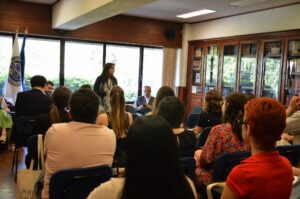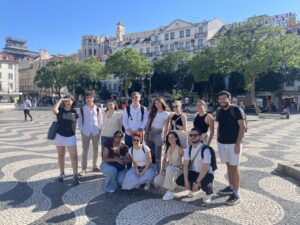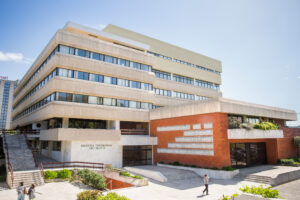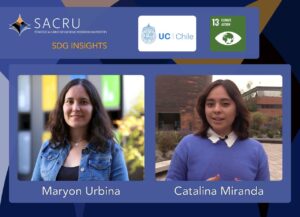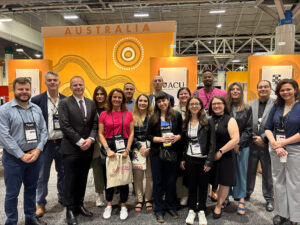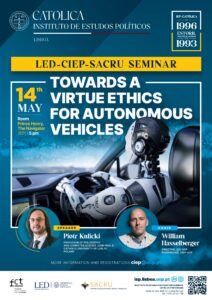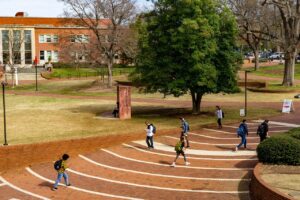What’s next for liberal democracy?
SACRU Summer School in Lisbon ended on a high note
![]()
![]()
![]()
![]()
![]()
![]()
![]()
![]()
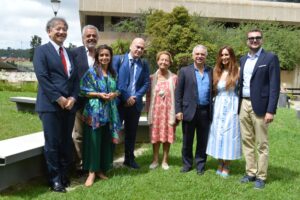
The program “A New World Order: The Way Ahead between Democracy and Authoritarian Challenges” was held from July 1 to July 14, 2024, at the campus of Universidade Católica Portuguesa. 16 students from 6 SACRU Universities shared unique perspectives on the future of liberal democracy in 42 hours of teaching divided into classes, tutorials, debates, and networking activities. Faculty members from Università Cattolica del Sacro Cuore and Sophia University joined to bring their expertise
There could not have been a more suggestive location than the city of Sintra, a UNESCO World Heritage Site, to officially conclude the inaugural SACRU Summer School “A New World Order: The Way Ahead between Democracy and Authoritarian Challenges,” held from July 1 to 14 at the Lisbon campus of the Universidade Católica Portuguesa. The visit to Sintra marked the end of the unique program of the Alliance, which gathered 16 students from 6 SACRU Universities to discuss the future of liberal democracy in light of pressing contemporary issues such as authoritarianism and democratic backsliding. Students, who came from different countries and disciplines, engaged in debates and discussions between themselves and with the 16 faculty members coming from Universidade Católica Portuguesa, Università Cattolica del Sacro Cuore and Sophia University.
The program enabled the participants to learn the key features of Political Leadership, Governance, and Democratic Practice in contemporary societies and addressed how to defend peace, pluralism, prosperity and human rights in light of the rapidly changing dynamics of contemporary global politics. «The inspiring success of this inaugural edition of the SACRU Summer School clearly shows how powerful the alliance between the diversity of scientific expertise, the willingness for generous communication and the spirit of cultural interchange can be when striving to find solutions to the mounting challenges threatening both the appeal and stability of liberal democratic forms of government. Our students came from all over the world and have been shaped by different cultural traditions and upbringings – still they were all deeply united in their commitment to delve deeper into the intricacies of democratic existence, and their passion for democratic ideals», Ana Cavalieri, Executive Director of the Summer School, commented.
The classes covered a whole spectrum of contents such as The Portuguese Revolution of 1974 and its rolling stones; Democracy and the challenges of populism and polarization, and the strategies to reshape world politics through the mix of hard and soft power. A specific focus was given on the critical topics like climate change and artificial intelligence through the classes of Raul Caruso, Full Professor of Economic Policy at Università Cattolica del Sacro Cuore, and Tetsuo Morishita, Full Professor of Law and Vice President for Global Academic Affairs of Sophia University.
Tetsuo Morishita addressed the topic of AI and the rule of law, stimulating students on how we could address AI to foster democracy: «Students actively expressed their views on issues such as what limitations AIs have, how various decisions in the democratic process may be delegated to AIs, and how AIs can be used to strengthen democracy. The students’ comments and questions were all excellent and to the point. Through the discussion, I believe we were able to deepen our thoughts on how democracy should interact with Ais. This Summer School is a valuable exchange opportunity not only for students but also for faculty members. I was only able to attend for a day and a half, but I wish I could have attended longer to further exchange views with students and other faculty members. I would like to express my sincere respect to those who have planned and implemented such a valuable learning opportunity».
Raul Caruso gave a lecture on the impact of climate change on social turmoil, and violence and protest: «The class was designed to stimulate students’ critical thinking on the relationship between violence and climate change, which was the core of the lecture. Students showed great engagement, bringing various approaches to the topic. This is due to the topic’s interdisciplinary nature and the different cultural contexts from which the students came. In fact, I believe the main strength of this SACRU initiative is that it stimulated both students and faculty members’ reflections».
Students were given the chance to have a 360-degree experience that was not only centred on class but also on cultural visits to the beauties of Lisbon, such as the Castle of Sao Jorge, the Belem Tower, and the Monastery of Jeronimos. Other social moments were a boat tour of Lisbon and listening to Fado, a typical Portuguese music, in a restaurant. These activities were important to complement students’ knowledge of democracy by strengthening inter-community ties and familiarity with SACRU.
The feedback from students in this regard was nothing but positive. «It was a real pleasure to travel to Lisbon to attend the first SACRU Summer School. The theme of the program provided a fascinating and timely backdrop for our discussions. With my background in law, I found the Summer School’s interdisciplinary approach immensely valuable, especially as it allowed me to learn from other disciplines, notably political theory. It was a remarkable learning pathway that allowed me to engage deeply with these topics. I had the opportunity to discuss with experts and peers from a variety of disciplines and cultures, making it a truly interdisciplinary and multicultural exchange. As part of the program, we visited various historical places such as Sintra, the National Palace of Pena, and the Belem Tower, among others. The experience of participating in the SACRU Summer School and immersing myself in Portuguese culture was, in a word, “inesquecível” – unforgettable. I am deeply grateful to SACRU and Universidade Católica Portuguesa for organizing such an excellent program and for their memorable hospitality», Lima Atkar, Ph.D. student in Law&Business at the Australian Catholic University, said.
To conclude the Summer School, students will present an academic portfolio composed of 10-15 sources on a case of their choice on democratic backsliding.

